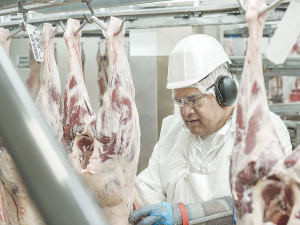Alliance Group says following delayed livestock flows - due to ideal growing conditions in both the North Island and the southern South Island - sheep and beef processing numbers are starting to crank up in the move to autumn.
In an update to suppliers in late February, the meat processor and exporter says it is continually aligning is processing capacity with livestock flows to ensure the company efficiently optimises cost structures.
"As a result, the livestock flows over the next few weeks are essential and we have put some plants on 'day-by-day' notice, which enables us to reduce capacity swiftly should we not have sufficient flow of livestock."
The company says it is also monitoring the drier conditions in parts of the country. "For example, Marlborough is reportedly experiencing its driest weather in almost a century with just 94mm of rain - almost half the average - falling between June and January."
Alliance also warned suppliers that the next couple of months will see reduced days available for processing due to public holidays - such as Easter and Anzac Day - a well as when it switches sheep claims to beef production from April onwards.
"We are mindful that there could be a squeeze on capacity when volumes peak," it told farmers. "We encourage you to liaise with your livestock representative so they can update forecasts to allow us to plan for the intended flows."
Meanwhile, the meat processor and exporter says, while there is some improvement in recent economic data out of China, any lift in lamb pricing is some way off.
"Early feedback post Chinese New Year indicates no material change to the market," it told suppliers. "Meanwhile, North American demand continues to improve with both retail and food service showing positive signs."
Alliance adds that EU demand is steady with in-market inventory continuing to reduce.
"Commodity levels in the UK remain steady with moderate demand."
It adds that the Middle East continues to provide a volume alternative for commodity products previously destined for China, but issues in the Red Sea have impacted the supply chain, adding increased costs and time to deliver to market. On the mutton front, Alliance says Chinese demand remains steady, particularly for full carcases, but the overall market is flat.
"We are continuing to diversify into wider Asia, namely Taiwan, Malaysia and Singapore. The EU/UK and North American markets remain a viable option for certain cuts."
For venison, the company says negotiation for 2024 key account frozen programmes are continuing with demand firm, particularly for middle cuts. But it warns that leg items remain 'challenging'.
"Manufacturing trim demand is improving with various market alternatives now appearing."
In the beef market, Alliance says consumption post-Chinese New Year remains steady with demand across beef cuts stable, but bone and offal pricing remains under pressure.
"Going forward, the key to China is market confidence, which at this stage remains subdued due to consumer concerns about the economy," it adds.
Alliance says it's confidence is growing with the greater certainty around future pricing levels. "The co-operative is continuing to place product in markets where we can realise the best carcase returns as there are variations in pricing appreciation across geographies."
The company adds that the short-term outlook is steady, albeit patchy across most major trading markets, except for China where ongoing economic instability and consumption is subdued.
"China is important as the 'anchor' and raises the price floor globally for all items. Early indications are the Chinese New Year will not provide the stimulus it has historically. As a result, we are actively moving forward contracts into alternative markets."



















